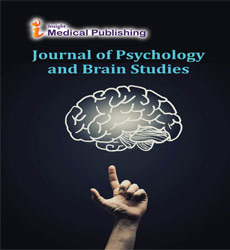The Changing Psychological Disorder of Identity
Anthony P. Monaco*
Department of Human Genetics, University of Oxford, Oxford, United Kingdom
- *Corresponding Author:
- Anthony P. Monaco
Department of Human Genetics
University of Oxford, Oxford, United Kingdom
E-mail: anthony.monaco@well.ox.ac.uk
Received Date: December 07, 2021; Accepted Date: December 21, 2021; Published Date: December 28, 2021
Citation: Monaco AP (2021) The Changing Psychological Disorder of Identity. J Psychol Brain Stud Vol. 5: No.12:59.
Dissociative Identity Disorder (DID), sometimes known as Multiple Personality Disorder (MPD), is a psychiatric disease defined by the persistence of at least two different and relatively stable personality states. Memory gaps that are not explained by typical forgetting accompany the condition. The personality states alternatively manifest in a person's conduct; nevertheless, the disorder's manifestations differ. Post-traumatic stress disorder, personality disorders (particularly borderline and avoidant), depression, substance use disorders, conversion disorder, somatic symptom disorder, eating disorders, obsessive–compulsive disorder, and sleep disorders are all common in people with DID.
Self-harm, non-epileptic seizures, flashbacks with amnesia for flashback content, anxiety disorders, and suicidality are all prevalent. Personality disorders are distinguished by strong and rigid personality traits that are stressful to the individual and/ or cause difficulties at job, school, or in social relationships. Furthermore, the individual's thought and behaviour habits are fundamentally different from societal norms and are so inflexible that they interfere with the individual's regular functioning. One example is antisocial behaviour. The term "dissociative" has been applied to a wide range of experiences, from normal errors in attention to the breakdowns in memory processes defined by dissociative disorders. As a result, it is unknown whether there is a commonality between all dissociative experiences or if the spectrum of mild to severe symptoms is the result of diverse etiologies and biological structures. There are no agreed-upon definitions for several terminology used in the literature, such as personality, personality state, identity, ego state, and amnesia.
Personality disorders include antisocial personality disorder, obsessive-compulsive personality disease, histrionic personality disorder, schizoid personality disorder, and paranoid personality disorder. The term "dissociative" has been applied to a wide range of experiences, from normal errors in attention to the breakdowns in memory processes defined by dissociative disorders. As a result, it is unknown whether there is a commonality between all dissociative experiences or if the spectrum of mild to severe symptoms is the result of diverse etiologies and biological structures. There are no agreed-upon definitions for several terminology used in the literature, such as personality, personality state, identity, ego state, and amnesia. There are several competing models that include some non-dissociative symptoms while eliminating dissociative ones. Personality disorders are classified into ten types. Personality disorders are long-term patterns of actions and interior perceptions that deviate significantly from what is expected.
A pattern of experience and behaviour has established by late adolescence or early adulthood that produces anxiety or functioning difficulties. If not treated, personality disorders might endure for a long time. Some types of psychotherapy can effectively address personality disorders. A person can learn more about their disease and what is causing their symptoms during psychotherapy, as well as discuss their thoughts, emotions, and behaviours. Psychotherapy can help a person comprehend the consequences of their actions on others, as well as learn to control or cope with symptoms and minimise behaviour. Several terms have been proposed as a result of the lack of agreement over terminology in the research of DID. The first is ego state (behaviours and experiences that have permeable boundaries with other such states but are united by a common sense of self), and the second is alters (each of which may have a separate autobiographical memory, independent initiative, and a sense of ownership over individual behaviour).
Open Access Journals
- Aquaculture & Veterinary Science
- Chemistry & Chemical Sciences
- Clinical Sciences
- Engineering
- General Science
- Genetics & Molecular Biology
- Health Care & Nursing
- Immunology & Microbiology
- Materials Science
- Mathematics & Physics
- Medical Sciences
- Neurology & Psychiatry
- Oncology & Cancer Science
- Pharmaceutical Sciences
